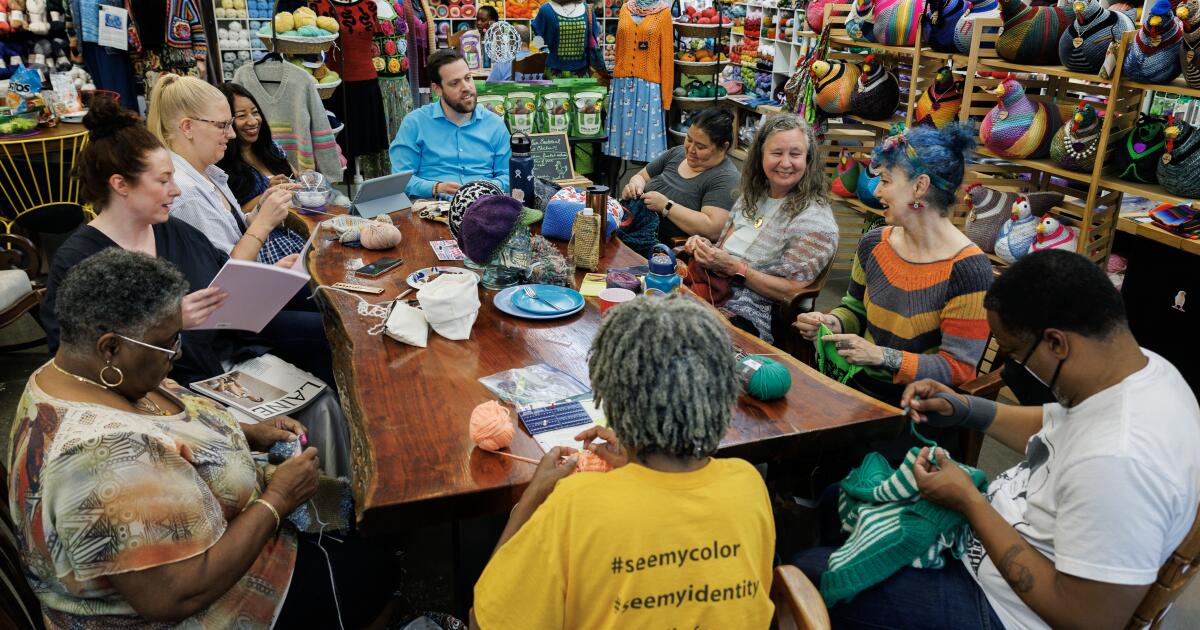She had me at “emotional support chickens.”
My friend Susan Kaufman was telling me about a yarn store in Inglewood where a multiracial, multigenerational crowd gathers twice a week to commune and knit. The store’s owner has created do-it-yourself knitting kits for overstuffed chickens with fanciful names like Baraaawk Obama, Hennifer Lopez and Paulina Poultryskova.
Opinion Columnist
Robin Abcarian
When you hug one of the chickens, Susan assured me, you would forget, at least for a moment, that a convicted felon, racist and fraudster might retake the White House in November.
“It sounds weird, but they really work,” said Susan, a therapist who knows about emotional support.
When she first invited me to tag along with her to the Knitting Tree, President Biden had not yet announced he was dropping out of the presidential race. Vice President Kamala Harris had not yet exploded into the national spotlight. And former President Trump was campaigning as if he had already won.
I needed some poultry therapy.
By the time I walked into the Knitting Tree a few weeks later, however, the depressing political landscape had seismically shifted, and so had the mood inside the store, said the store’s owner, Annette Corsino.
1
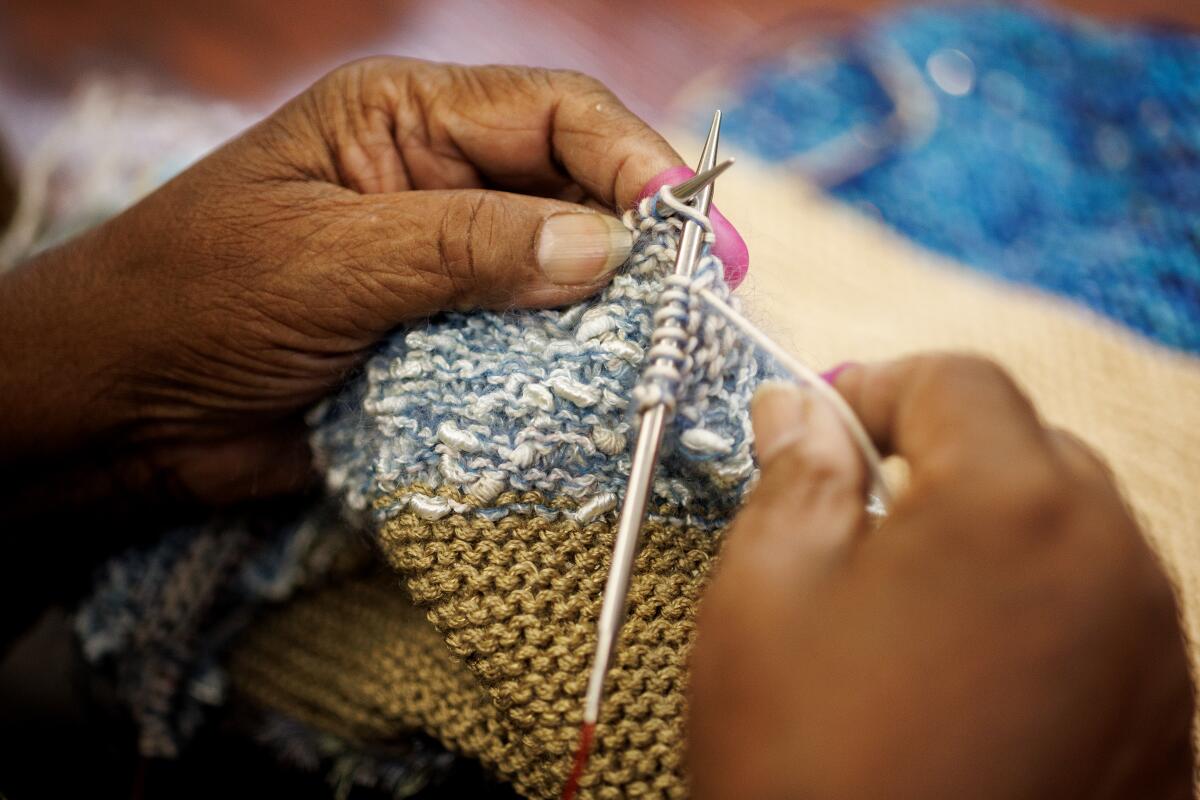
2
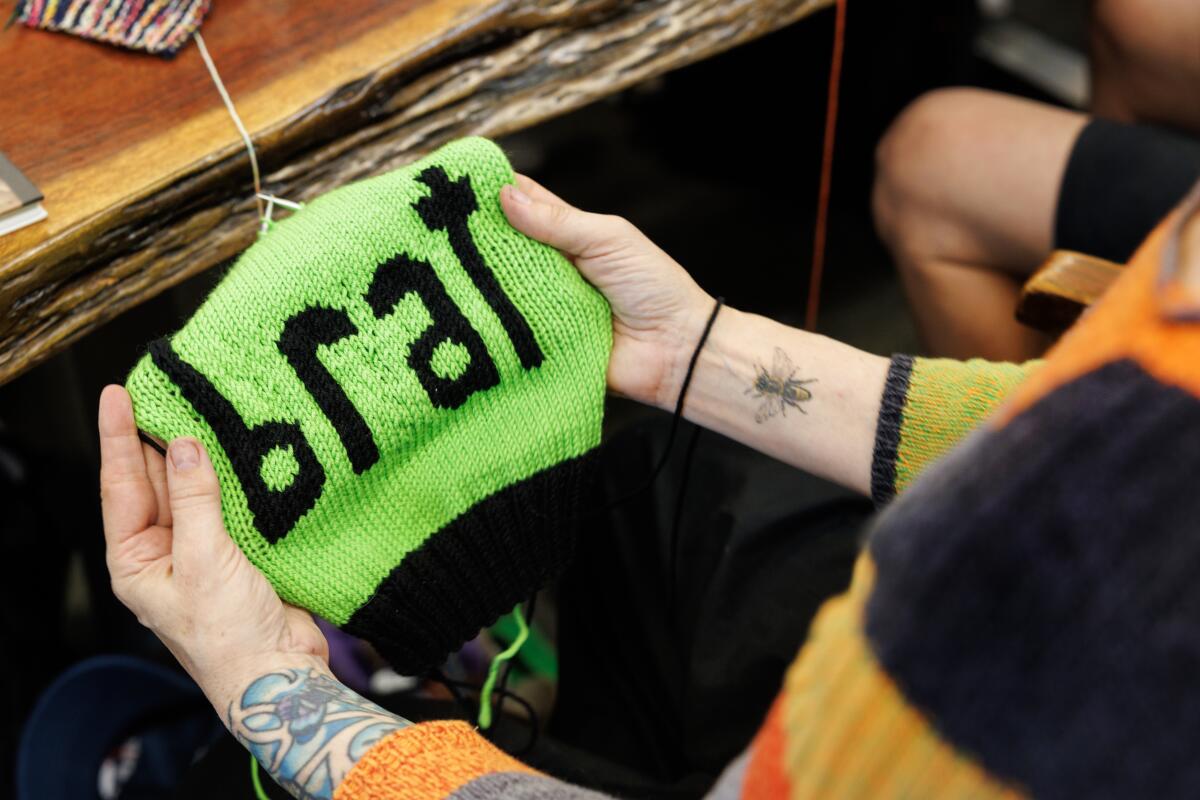
3
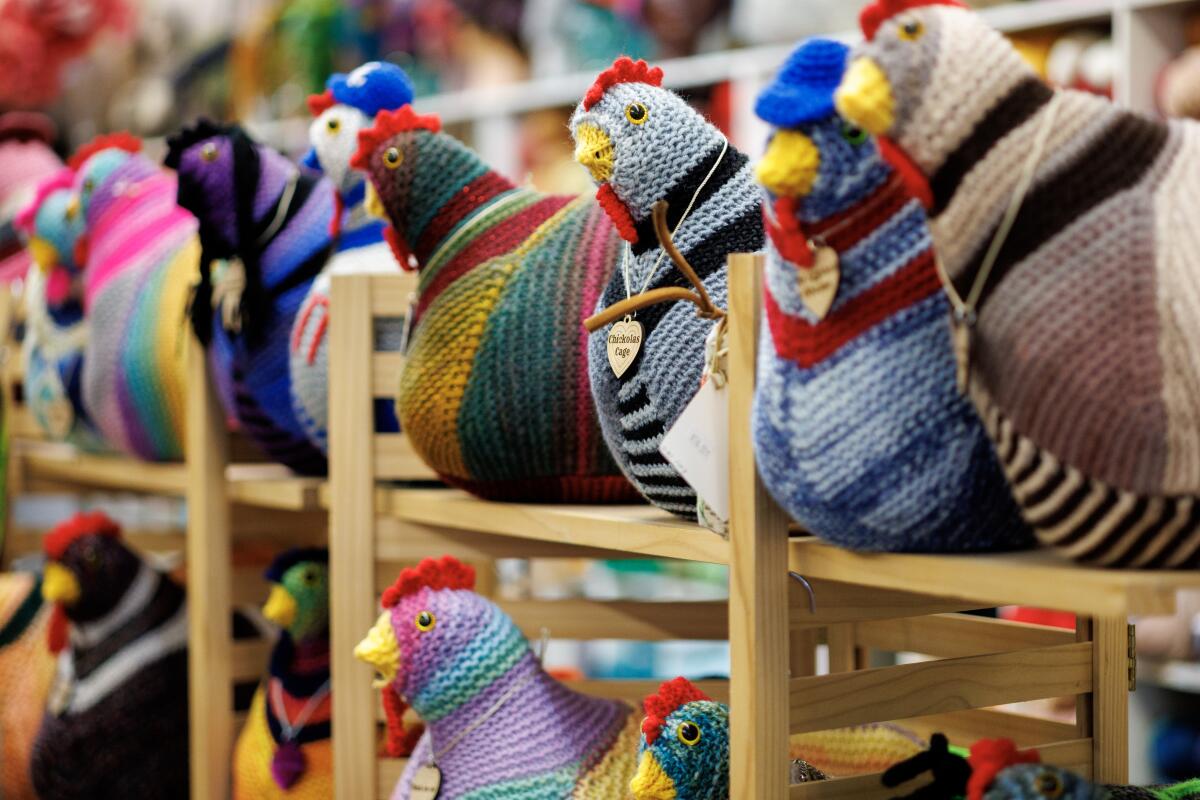
1. Chris Parker of Los Angeles works her needles through yarn for a sweater at the Knitting Tree LA. 2. The store’s owner, Annette Corsino, works on a “BRAT” hat that makes a political statement. 3. Emotional support chickens line the shelves.
“Before this, the mood was pretty grim,” said Corsino, 62, whose lavender curls and plethora of tattoos telegraph the ascendance of a hipper knitting generation. “But people are feeling much better now. They’re smiling more. There’s hope.”
I hugged Baraaawk Obama to my chest. It felt good, really good.
Corsino nodded approvingly. “Our motto is: ‘Life is hard. We all need a chicken to make it better.’ ”
The Knitting Tree is located in a drab low-slung office park sandwiched between a car rental place and a golf apparel outlet on Manchester Boulevard. It looks super boring on the outside.
Entering the shop, though, is like walking into a Technicolor Oz. Brilliant spools of yarn line the walls, and therapy chickens perch on high shelves. Walter and Carmen, Corsino’s wire-haired dachshunds, wander about. Carmen barks at everyone; Walter climbs into laps and perches his long nose on the huge wood table that is the heart of the store. The table is where knitters and crocheters — young, middle-aged, elderly, Black, white, Asian and Latino — work and talk and laugh. And sometimes cry. Two of the knitters are nursing ailing husbands.
This place seemed like a multiracial version of a traditional Black barbershop.
“Actually, no,” said Jacqueline Camacho, 70, who worked for 46 years as an airline customer service agent at LAX. “It’s more of a family affair.” Camacho lives in Valencia and comes to Inglewood as often as she can.
“More like ‘Cheers,’ ” added Ana Petrova, 83, who fled Hungary after the 1956 revolution was crushed by the Soviet army and ended up in Venice, where she and her husband, Peter, operated a business on Lincoln Boulevard, selling and repairing British cars.
“At the barbershop,” said Camacho, “they just gossip and gossip, and we don’t do that here.”
“Everybody knows your name,” said Petrova. “And sometimes we do drink.” (During Wednesday evening potlucks, mostly, although sometimes on Sundays, too. I spied a bottle of Champagne on the nearby food table.)
Camacho was asking Petrova what to do about a stitch she dropped while knitting a sweater.
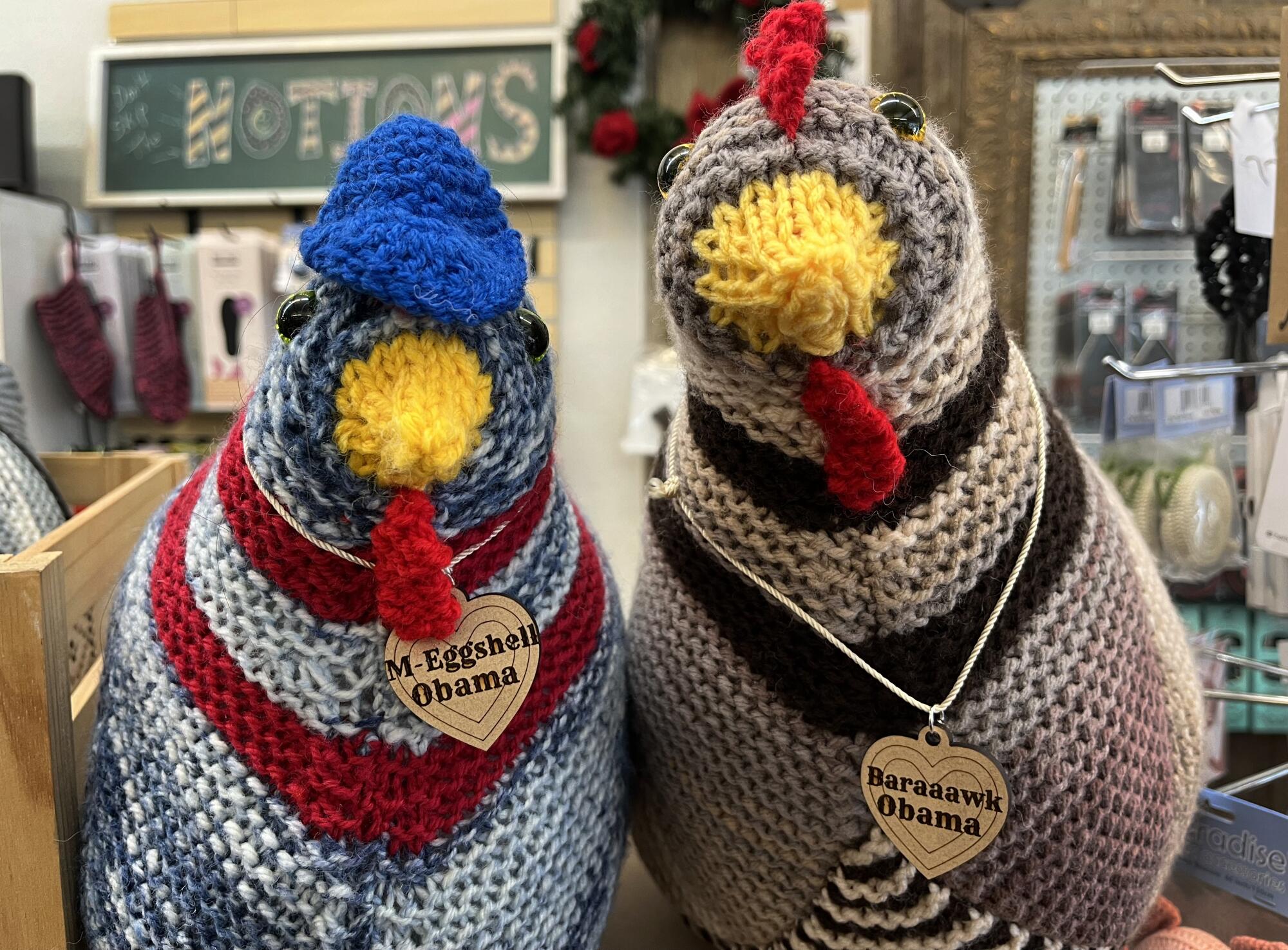
Creations at the Knitting Tree LA with a political theme.
(Robin Abcarian / Los Angeles Times)
“Where is it?” asked Petrova.
“Under the armpit,” Camacho replied.
“Live with it.”
Later, I heard Petrova give a knitter advice that could apply to almost any of life’s challenges: “The slower you go, the faster you’ll finish.”
Toward the front of the store, a class was working on a felted tote bag with the blue-and-white “Greek key” design familiar to anyone who has ever bought a cup of coffee in Manhattan.
“It’s fun to nerd out about Greek mythology,” said knitting teacher Theresa Havton, a mother of four adult sons, including triplets. I guessed that her singleton was the first born. “It would not have happened any other way,” said Havton, a former computer engineer, whose husband is a spinal cord surgeon who practices in New York.
“We have a brain trust here,” Corsino told me. “We have doctors, lawyers, nurses, scientists, lots of engineers. During the strike, we had a lot of film industry people. I never see anybody outside of here. This is my social life.”
At the big table, Anjeanette Bumatai, 54, was working on a blanket. She wore a blue baseball cap pulled low over her forehead and a “Babes Ride Out” T-shirt. Bumatai owns an insurance agency, rides a Harley and had just returned from a gathering of female bikers in Deadwood, S.D. During her two weeks on the road, she said, she rode through Nevada, Idaho and Wyoming.
“I was in Trump country,” she told me. “It’s amazing how much people adore him. It’s a cult of personality. I would talk to someone and say, ‘What has he done for you?’ They can’t name anything. As a person of color, I think the majority of Black people do not care for him.”
She sounded suspiciously like a childless cat lady, the infamous insult lobbed at Harris, stepmother of two, by Trump’s running mate, Sen. JD Vance of Ohio.
“I guess I am!” she said, laughing. “I guess my husband’s kids don’t matter.”
Corsino, who has sold more than 3,000 emotional support chicken kits — at $39.50 a pop — and 25,000 chicken patterns, told me she is working on a new pattern, based on a popular Harris campaign meme inspired by the British pop star Charli XCX.
Borrowing the shape of the celebrated pink pussy hat popularized during the anti-Trump Women’s March of January 2017, this one will be lime green. Black lettering will spell out the word “BRAT.”
